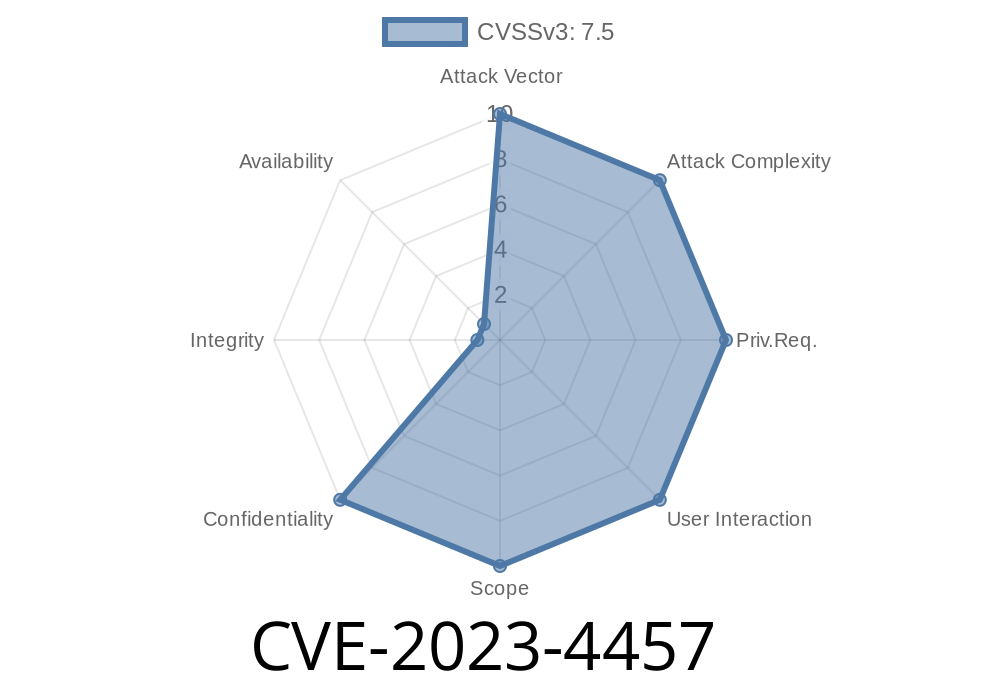Grafana is one of the most popular open-source platforms for monitoring your infrastructure, systems, and applications. With its vibrant ecosystem, users often connect extra data sources through plugins—including Google Sheets, for quick real-time dashboards. But in 2023, a security bug in the official Google Sheets data source plugin (CVE-2023-4457) threatened to leak sensitive API keys. In this post, we'll break down what happened, the implications, some sample code, and how you can protect yourself.
What is CVE-2023-4457?
CVE-2023-4457 is an information disclosure vulnerability in the Grafana Google Sheets data source plugin (versions .9. through 1.2.2). The plugin lets you visualize data from Google Sheets but, due to a coding oversight, it could accidentally expose sensitive details—like your Google Sheets API-key—through unsanitized error messages.
Fixed in: 1.2.2
Official advisory: Grafana Plugin Advisory CVE-2023-4457
How Did the Vulnerability Happen?
When the plugin tried to fetch or read data from Google Sheets, any errors (like bad network or invalid sheet ID) were shown back to the user as error messages. However, these error messages sometimes included raw request info, accidentally leaking the API-key used in backend requests.
In simple terms:
If you ran into an error with your Google Sheets data source, the plugin might show you (or anyone else who could trigger an error) the full API request—including your private Google Sheets API-key.
Here’s a sample code excerpt (simple pseudo-code) that illustrates the problem
// Vulnerable code in the plugin
func getSheetData(apiKey string, sheetID string) (data, error) {
resp, err := http.Get("https://sheets.googleapis.com/v4/spreadsheets/"; + sheetID + "?key=" + apiKey)
if err != nil {
// BAD: this returns the error directly, possibly including URL with API key
return nil, errors.New("Failed to fetch sheet: " + err.Error() + ". URL: " + resp.Request.URL.String())
}
}
In the above, if an error happens (say the sheet doesn't exist), the returned error could print the entire URL—which includes your API key—on the Grafana dashboard. Anyone with access to read these errors could potentially see (and steal) your API key.
Impact: What Could Go Wrong?
- Leak of Google Sheets API Key: Anyone with access to Grafana’s error logs or dashboards could copy the API key.
- Data Exposure or Manipulation: If malicious users get your API key, they could access, change, or delete your Google Sheets data—depending on the key’s permissions.
- Broader Attack Surface: If you use the same API key elsewhere, attackers could potentially use it to impact other systems.
Exploit Path: Step-by-Step Scenario
1. An authenticated (or possibly unauthenticated) user interacts with the Google Sheets data source plugin.
User copies out the key and uses it elsewhere.
In most setups, you'd need to at least be able to trigger a failing query and view its details (e.g., in Grafana’s Explore panel, panel error tooltips, or server logs).
Fix: How Did Grafana Patch This?
The fix was straightforward: change the plugin to only include sanitized error messages, never including sensitive details like the API key.
Fixed code example
// Fixed code in the plugin
func getSheetData(apiKey string, sheetID string) (data, error) {
resp, err := http.Get("https://sheets.googleapis.com/v4/spreadsheets/"; + sheetID + "?key=" + apiKey)
if err != nil {
// GOOD: Error does not leak sensitive info
return nil, errors.New("Failed to fetch sheet: " + err.Error())
}
}
Always sanitize what error details you log or display externally—never echo secrets in error output.
Upgrade the plugin to version 1.2.2 or newer immediately
Get the latest plugin version here
References
- Official CVE tracker
- Grafana Security Advisory for CVE-2023-4457
- Grafana Plugin: Google Sheets Data Source
TL;DR: Don't Let Simple Mistakes Spill Your Secrets
CVE-2023-4457 is a classic example of how small oversights (like leaking error strings) can lead to big security risks. Always keep your software up to date, use least-privilege API keys, and watch what your error messages reveal.
If you’re using Grafana with Google Sheets, double-check your plugin version, and upgrade now. Don’t let your most valuable data get stolen by a simple spelling mistake in your code!
Timeline
Published on: 10/16/2023 10:15:00 UTC
Last modified on: 10/20/2023 15:17:00 UTC
